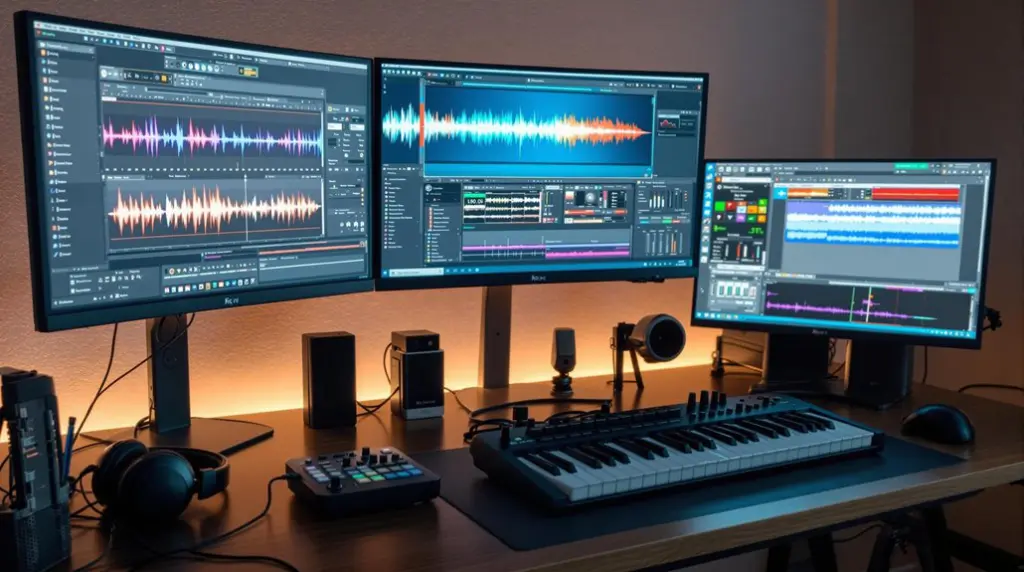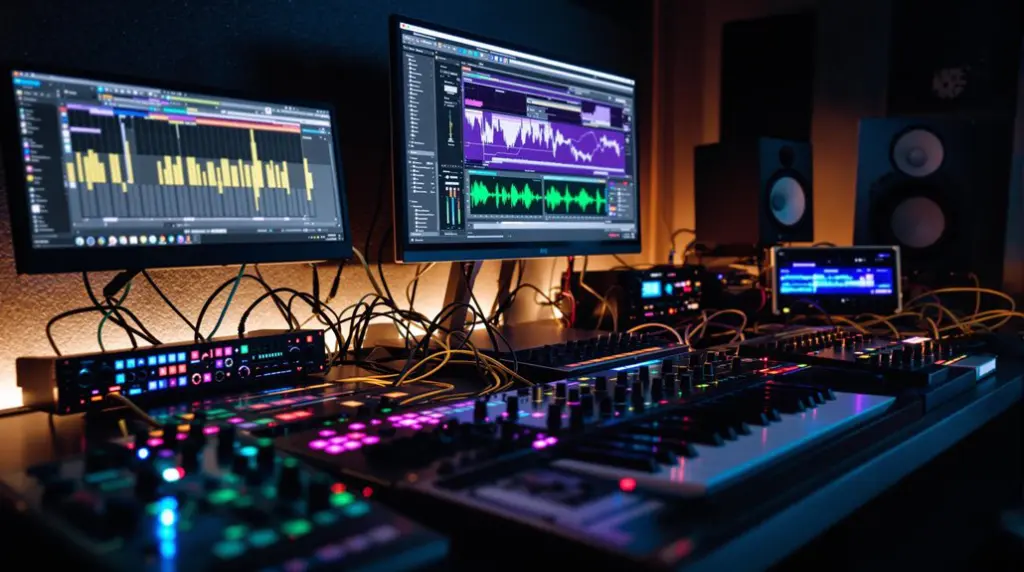Native Instruments RC 48 and RC 24 VST plugins are distinguished by several key features: vintage sound emulation, precise reverb algorithms, intuitive user interface, and extensive modulation options. RC24 specializes in rich, vintage reverb tones via three specific algorithms, while RC48 offers six advanced algorithms for lifelike soundscapes. Both plugins support high-quality audio up to 192 kHz and exhibit low CPU usage. Customization features include advanced diffusion, pre-delay control, and flexible modulation. Built-in presets enhance usability, and compatibility with all major DAWs guarantees seamless integration. Further exploration will uncover the depth and versatility these plugins offer.
Key Takeaways
- High-Quality Audio Processing: Both plugins support up to 192 kHz audio processing for professional sound quality.
- Vintage and Modern Reverb Algorithms: RC24 offers three vintage algorithms, while RC48 includes six advanced diffusion algorithms for diverse reverb effects.
- User-Friendly Interface: Minimalistic layouts with real-time feedback enhance the user experience and efficiency in sound modifications.
- Extensive Customization Options: RC48 features parameters like Size, Diffusion, and Spread, while RC24 includes six control sliders for detailed reverb shaping.
- Low CPU Usage: Both plugins ensure efficient performance, allowing seamless integration into complex productions without excessive CPU load.
Overview of NI Reverb Classics
The NI Reverb Classics suite, comprising the RC24 and RC48 plugins, offers an all-encompassing toolkit for audio engineers and music producers seeking high-quality reverb effects.
These plugins are renowned for their versatility and efficiency, making them suitable for a broad spectrum of reverb applications across various musical genres. In a plugin comparison, the RC24 stands out with its emulation of vintage reverb sounds, featuring several preset emulation programs designed to replicate classic reverb units.
On the other hand, the RC48 is celebrated for its lifelike reverb characteristics, providing extensive customization options that allow users to tailor reverb settings meticulously to fit specific production needs.
Both plugins feature user-friendly interfaces and are compatible with major Digital Audio Workstations (DAWs), supporting VST, AU, and AAX formats, ensuring seamless integration into existing workflows.
Furthermore, both the RC24 and RC48 boast low CPU usage, enabling efficient performance without compromising on quality. They support high-quality audio processing up to 192 kHz, ensuring pristine audio fidelity.
Whether enhancing the spatial dimension of a track or creating lush, immersive soundscapes, the NI Reverb Classics suite proves indispensable for modern audio production.
Vintage Sound Emulation
Focusing on the RC24’s capacity for vintage sound emulation reveals its dedication to replicating the iconic character of classic reverb hardware, particularly the Lexicon 224. The RC24 meticulously emulates vintage reverb sounds, providing a gritty, textured character that enhances recordings. This is achieved through three distinct reverb algorithms—Large Hall, Small Hall, and Room—each designed to recreate the classic hardware’s unique ambiance.
Additionally, the RC24’s algorithms can be layered with other reverbs for unique soundscapes, enhancing its versatility.
Key features that promote this vintage emulation include:
- Six intuitive sliders: Parameters such as Depth and Intensity enable users to fine-tune the reverb effect, crafting the desired vintage ambiance.
- Efficient CPU usage: The RC24 is engineered to apply vintage reverb effects efficiently, guaranteeing high performance across various music genres.
- Versatile soundscapes: The algorithms provide a range of vintage soundscapes, from spacious halls to intimate rooms, enhancing the plugin’s versatility.
Additionally, the RC48 complements this by offering small room and plate-like effects, further expanding the scope of vintage appeal.
Both plugins are designed to deliver low CPU usage, maintaining performance integrity while delivering high-quality, classic reverb emulations. This balance of authenticity and efficiency guarantees that the RC24 and RC48 remain indispensable tools for any digital audio workstation seeking that timeless, vintage reverb sound.
Reverb Algorithms
Understanding the intricacies of reverb algorithms in Native Instruments‘ RC48 and RC24 plugins is crucial for harnessing their full potential. The RC48 features six distinct early reflections or pre-echoes, which users can position to craft a more dynamic sound environment. This capability notably enhances spatial effects, enabling audio engineers to simulate a variety of acoustic spaces.
Additionally, the advanced diffusion algorithms in RC48 guarantee a smooth sound, ideal for creating larger spaces with extended decay times, thereby catering to diverse reverb types. The RC48’s ability to adjust predelay settings allows for precise control over the clarity and spatial depth of the audio mix.
The RC24 plugin, on the other hand, is designed to emulate vintage reverb sounds. It offers three dedicated algorithms: Large Hall, Small Hall, and Room. Each algorithm caters to specific spatial needs, allowing for precise control over the acoustic characteristics of a mix.
The inclusion of modulation options, with four modulation types and adjustable crossover frequency for bass and mid frequencies, adds further depth to the reverb, enhancing the overall spatial effects.
Moreover, while the RC24 focuses on replicating classic hardware reverb units, the RC48 is geared towards delivering a more lifelike character, making these plugins highly versatile for a wide range of musical genres. This diversity in reverb algorithms guarantees that both plugins meet the sophisticated demands of modern audio production.
User Interface Design
A well-designed user interface is paramount in guaranteeing seamless interaction with Native Instruments’ RC48 and RC24 plugins. Both plugins showcase a minimalistic and intuitive layout, fostering a user experience that emphasizes design simplicity.
The RC48 features a graphical representation of six distinct early reflections, allowing users to easily visualize and modify reverb characteristics. Additionally, this graphical representation aids in understanding sound manipulation and synthesis methodologies. This visual feedback mechanism is critical for real-time adjustments, aiding in the precise tailoring of the reverb effects.
In contrast, the RC24 opts for a straightforward approach with six sliders that control essential parameters, such as Pre-delay, Depth, Intensity, and EQ. This design simplicity guarantees that users can swiftly shape the reverb sound without maneuvering through complex menus or settings.
Key aspects of the user interface design include:
- Graphical Representation: RC48’s graphical display enhances user understanding of reverb parameters.
- Slider Controls: RC24’s six sliders provide a hands-on approach to parameter adjustments.
- Real-time Feedback: The RC48’s visual display allows for immediate sound modifications.
Additionally, both plugins are fully compatible with major DAWs and support multiple formats (VST, AU, AAX), guaranteeing seamless integration into any existing setup. This compatibility underscores the thoughtful design aimed at enhancing the overall user experience.
Modulation Options
Modulation options in Native Instruments’ RC48 and RC24 plugins frequently provide users with the tools necessary to add depth and dynamic movement to their reverb effects. The RC24 offers four distinct modulation types, allowing for intricate adjustments that enhance the tonal dynamics and overall character of the reverb. These controls include a feature for adjusting the bass/mid crossover frequency, which plays a vital role in shaping the reverb’s tonal balance and introducing nuanced modulation depth.
The RC48, on the other hand, goes a step further by offering extensive customization of reverb parameters, including modulation settings that greatly influence the perceived size and character of the reverb. This plugin’s advanced diffusion algorithms work synergistically with modulation to deliver a smooth, lush sound that enhances the realism of the reverb effect. Both plugins feature a modulation control that affects the intensity and behavior of the reverb tail, providing additional modulation creativity for sound designers and musicians alike.
| Plugin | Modulation Types | Key Features |
|---|---|---|
| RC24 | 4 | Bass/Mid Crossover Control |
| RC48 | Extensive | Advanced Diffusion |
| Both | Tail Modulation | Enhanced Realism |
These modulation options, paired with flexible controls, enable users to craft reverb effects with unparalleled depth and creativity.
Early Reflections
While modulation options enhance the dynamic movement of reverb effects, early reflections play a pivotal role in shaping the initial character of the reverb. In the Native Instruments RC 48 plugin, early reflection techniques are meticulously designed to offer six distinct pre-echoes. These can be precisely positioned by the user, allowing for a refined control over the reverb soundscapes.
The graphical representation of these early reflections displays discrete delays extending up to 500ms, affording users the ability to make detailed adjustments to the early sound stage. This feature is particularly valuable for creating lifelike reverb experiences, as it allows:
- Precise positioning of pre-echoes: Users can tailor the spatial characteristics to match specific acoustic environments.
- Enhanced spatial perception: Through manipulation of the pre-delay parameter, the timing between the direct sound and the onset of reverb can be fine-tuned.
- Detailed control over initial sound character: The flexibility in adjusting early reflections guarantees a more realistic and immersive reverb.
In contrast, the RC 24 emphasizes vintage reverb sound through algorithmic controls, including pre-delay settings, rather than focusing explicitly on early reflections. This distinction highlights the RC 48’s advanced capabilities in crafting intricate reverb soundscapes.
Customization Features
How does the Native Instruments RC 48 & RC 24 excel in offering broad customization features for reverb effects?
The RC 48 plugin demonstrates significant parameter flexibility, allowing users to adjust Size, Diffusion, Spread, Rev Damping, and Pre-delay. This array of controls provides a thorough toolkit for sound tailoring, enabling precise manipulation of the reverb effect to match specific sonic requirements.
Enhanced by advanced diffusion algorithms, the RC 48 guarantees that the reverb remains smooth and lush, making it ideal for creating expansive soundscapes. For DJs, utilizing reverb buses can create cohesive settings that unify the auditory space.
The graphical representation of six discrete delays up to 500ms in the RC 48 further augments its customization capabilities. This visual aid allows users to accurately position early reflections, contributing to the overall spatial quality and depth of the reverb effect.
Similarly, the RC 24 offers significant parameter flexibility with its six essential control sliders: Pre-delay, Depth, Intensity, Bass, Mid, and Hi-cut.
These controls facilitate detailed shaping of the reverb sound, allowing users to fine-tune each aspect to their liking. Whether it is tweaking the depth or adjusting the tonal balance, the RC 24 provides the necessary tools for meticulous sound tailoring, guaranteeing that each reverb effect can be uniquely crafted to suit the user’s creative vision.
Built-in Presets
A notable feature of the Native Instruments RC 48 and RC 24 VST plugins is their extensive library of built-in presets, providing immediate access to a broad spectrum of reverb sounds tailored for various musical genres.
The RC24 emphasizes a vintage sound character, offering a diverse range of lush reverb effects that are suitable for numerous applications. These presets are invaluable for those seeking to incorporate classic reverb textures into their projects with minimal effort.
In contrast, the RC48 features presets designed for studio-grade reverb, enhancing acoustic instruments and vocals with rich, refined sound quality. This preset versatility guarantees that users can find an appropriate starting point for any recording scenario.
Additionally, both plugins allow users to modify these built-in presets, offering extensive customization options while maintaining the inherent sound characteristics. The RC48’s presets provide warmth and depth similar to room reverb, which enhances instrument presence across genres.
Key aspects of the built-in presets include:
- Vintage sound character in RC24: Ideal for creating lush, classic reverb effects.
- Studio-grade presets in RC48: Enhances acoustic instruments and vocals with precision.
- Customizable presets: Enables tailored sound design while preserving original qualities.
These built-in presets serve as a foundational tool, facilitating experimentation and refinement in reverb sound design.
Audio Quality
Delving into the audio quality of the Native Instruments RC 48 and RC 24 VST plugins reveals an exceptional standard of sonic excellence. Both plugins support high-quality audio processing with a sample rate of up to 192 kHz, guaranteeing pristine sound fidelity essential for professional applications.
RC24 emulates vintage reverb sounds with a unique gritty character, making it ideal for genres that benefit from a touch of analog warmth. Conversely, RC48 offers a more lifelike reverb quality, perfectly suited for acoustic instruments and vocals, thanks to its advanced diffusion algorithms. These algorithms deliver smooth and detailed reverb tails, greatly enhancing the depth and richness of the sound.
Furthermore, these plugins help achieve a competitive edge in the music market by guaranteeing high-quality reverb effects that contribute to a polished final product.
Additionally, both plugins are designed to maintain low CPU usage, allowing for efficient performance without sacrificing audio fidelity during complex productions. This efficiency guarantees that producers can integrate these plugins into their workflows seamlessly, even in resource-intensive projects.
The inclusion of built-in presets further enhances the usability of the RC24 and RC48, providing quick access to high-quality reverb sounds that require minimal tweaking. Consequently, these features make the RC24 and RC48 indispensable tools for achieving professional-grade audio quality in diverse musical contexts.
System Compatibility
Given the impressive audio quality of the Native Instruments RC 48 and RC 24 VST plugins, their system compatibility is equally remarkable.
These plugins are designed to integrate seamlessly with major Digital Audio Workstations (DAWs), supporting VST, AU, and AAX formats. The installation requirements are well-defined, ensuring users face minimal obstacles in the setup process.
Both plugins require either macOS 12, 13, or 14, or Windows 10 or 11 (64-bit) operating systems to function effectively.
To guarantee robust system performance, users must meet certain hardware specifications. A minimum of 4 GB RAM is required, although 6 GB is recommended for enhanced efficiency. Additionally, an Intel Core i5 or an equivalent AMD CPU is necessary to handle the processing demands of these advanced audio tools.
The plugins support both 32-bit and 64-bit systems, ensuring broad compatibility across various computing environments.
- Compatible with major DAWs supporting VST, AU, and AAX formats.
- Requires macOS 12, 13, or 14, or Windows 10 or 11 (64-bit).
- Minimum 4 GB RAM (6 GB recommended) and Intel Core i5 or equivalent AMD CPU.
An internet connection is mandatory for download and activation, but offline use is available once the plugins are installed.
Frequently Asked Questions
What Is RC 24?
The RC 24 overview reveals it as a VST plugin emulating vintage reverb sounds. RC 24 applications include diverse musical genres, providing adjustable sliders and modulation options for precise control, delivering a grainy, textured reverb characteristic of classic hardware units.
Conclusion
To sum up, the Native Instruments RC 48 and RC 24 VST plugins offer a robust suite of features, including vintage sound emulation, advanced reverb algorithms, and a user-friendly interface design. These tools provide extensive modulation and customization options, supported by a range of built-in presets, ensuring high audio quality. Their compatibility across various systems makes them versatile additions to any audio production setup, catering to both professional and amateur audio engineers.




